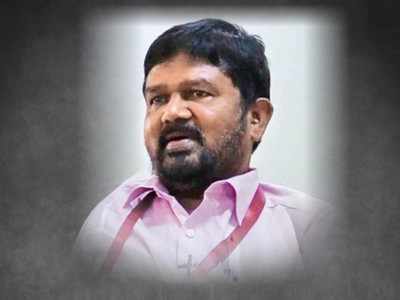
COVID cuts short poet Siddalingaiah’s struggle against casteism
Renowned Kannada poet Siddalingaiah, 67, died due to COVID-19 in Bengaluru’s Manipal Hospital on Friday (June 11). Popularly known as "Dalita Kavi" (Dalit Poet), he was also a playwright, activist, and politician.

Renowned Kannada poet Siddalingaiah, 67, died due to COVID-19 in Bengaluru’s Manipal Hospital on Friday (June 11). Popularly known as “Dalita Kavi” (Dalit Poet), he was also a playwright, activist, and politician.
Siddalingaiah’s notable works include ‘Holemadigara Haadu’, ‘Saaviraaru Nadigalu’, ‘Kappu Kaadina Haadu’ and ‘Meravanige’ among others. He had written plays like ‘Panchama’, ‘Ekalavya’ and one of his popular essays was ‘Gramadevathegalu’.
“Despite our best efforts, Siddalingaiah succumbed to his illness at 3.45 pm on June 11,” a statement by the hospital said. He is survived by his wife, a son and a daughter.
As the founding member of Dalit Sangarsh Samithi, a Dalit rights organisation, Siddalingaiah fought for the uplift of Dalits and tried to unite people of Karnataka to fight caste oppression.
Several of his works have been translated into English and other languages and ‘Ooru Keri’- an autobiography, had won him the Sahitya Akademi award. Siddalingaiah is also the first Dalit poet who received Pampa Award, the highest literary award in Kannada, presented by the Karnataka government. Besides, he also won Nadoja award, given by Hampi University and Rajyostava award, among others.
Siddalingaiah had also chaired the 81st Kannada Sahitya Sammelana (a premier gathering of Kannada literature) held in Shravanabelagola. He had also served as a member of the Karnataka Legislative Council and Chairman of the Kannada Development Authority, a post with Cabinet rank, and had taught Kannada at Bangalore University.
Chief Minister B S Yediyurappa also expressed his condolences. “In his death, we have lost a great writer with social concern, who strove for the uplift of the depressed classes,” the Chief Minister said in his condolence message.
Former Prime Minister H D Deve Gowda, several of Yediyurappa’s Cabinet colleagues and Leader of Opposition Siddaramaiah, JD(S) leader H D Kumaraswamy, among others, have expressed grief over Siddalingaiah’s death.
In 2019, in an interview with an English daily, Siddalingaiah said his journey as a poet started with him expressing to his friends about his childhood experiences that haunted him. Born in a Dalit family in 1954 in Magadi, on the outskirts of Bengaluru, Siddalingaiah had to face a lot of hardship. He was influenced by the thoughts of Dr B R Ambedkar, Mahatma Gandhi and socialist leader Ram Manohar Lohia.
Also read: If you reject politics, you distance yourself from society: Writer Imayam
“His poems, ‘Yarige Banthu’, ‘Ellige Bantu’, ‘Nalvathayelara Swatantrya’ and ‘Nanna Janagalu’ (My people) were like an anthem for us during protests and meeting. Even today they are relevant and it inspires us to fight caste oppression and atrocities,” says activist and social worker Lakshmi Bhavge.
Siddalingaiah’s poems are relevant more today in the face of rising economic inequalities, farmers’ suicides, privatisation and labour exploitation, says Bhavge.
The litterateur looked at injustice through the lens of humour, which reflects in his autobiography ‘Ooru Keri’, translated into English by S R Ramakrishna as ‘A word with you world’. Siddalingaiah had said his father was convinced that his son could be jailed for writing aggressive and angry words against the system, and hence he tore his poetry book and burnt it.
The poet also attacked politicians and expressed anger at how the system had become a puppet in the hands of the upper caste.
“They hold “meetings” about us, draft laws for our sakes; pat each other’s backs in our name. They’ll liberate us, they declare in the papers – how they yell from their mikes! Yet no school for us, my friends, only drudgery. Nor can we hold our heads up. They’re playing games with us, these bastards!” Siddalingaiah had once said.
He had wished that victims of all castes should unite like thousands of river that join the ocean, to rebel, and go beyond the struggle of untouchability.
Late critic D R Nagaraj once wrote that Siddalingaiah’s fire-spirited poetry of the 1970s and 80s shaped the sensibility of a generation or two. “The political fury and rage that have gone into his poetry were also a reflection of the inner emotional state of the Dalit movement,” he had said.


